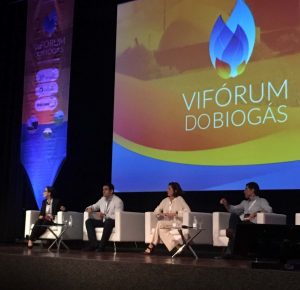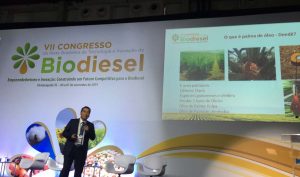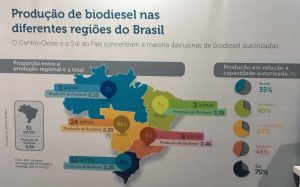by Cácia Pimentel* (Advanced Biofuels USA) Brazilian Biofuels Market players have been busy in the past days, with various seminars and forums organized to discuss the economic and technological development of the sector. Brazil is well known for its clean energy matrix, mostly coming from hydroelectric dams and the well-established sugarcane ethanol industry. Biofuel production can greatly benefit from the soar of innovations in the field, especially those developed and adapted in the country.
Here are some highlights of the recent events:
S&P Global Platts, October 30th: Government representatives, academics and producers met in São Paulo to discuss the sugar and ethanol market. Global sugar consumption growth is slow, as campaigns against sugar intensify. Therefore, world supply is expected to rise by 5.2% in 2020-2021, led by India, EU, Russia and Brazil. India announced export quotas for 6 million tonnes for 2019-20 and gives export subsidy of $146-147/mt. Sugar stocks are increasing around the world and prices have been below cost of production for a long time. The extreme price brings a higher market volatility. The base case scenarios on global consumption and production growth of sugar shows the world will still be in an oversupply up to 2024-2025.
On the other hand, there is a growing global demand for ethanol. According to Beatriz Pupo, Biofuel Senior Analyst from Platts Analytics, 87% of biofuel demand comes from mandates. By 2020, global biofuels demand is estimated at 166 billion liters, mainly due to growing demand in China. Thus, the highest growth rates are expected in Asia, up from 8% against 3% in the rest of the world. The market expects that, in the long run, the mandatory share of ethanol in gasoline will grow, but consumption may sink due to the growth of electric vehicles.
In Brazil, ethanol demand as a component of or alternative to gasoline will continue to grow. There is potential for higher demand levels with a successful RenovaBio program implementation.
RenovaBio is a state policy that aims to outline a strategy to recognize the strategic role of all types of biofuels in the Brazilian energy matrix, both for energy security and for mitigating greenhouse gas emissions.
Unlike traditional measures, RenovaBio does not propose the creation of a carbon tax, subsidies or volumetric mandates to add biofuels to fuels. The Brazilian program establishes national emission targets for the fuel matrix, set for a 10-year period and a certification of biofuel production. This certification assigns different grades to each producer, in a value inversely proportional to the carbon intensity of the biofuel produced. The grade reflects the individual contribution of each producing agent to the mitigation of a specific amount of greenhouse gases, relative to its fossil substitute (in tons of CO2e).
These two instruments will be linked together with the creation of the CBIO (Biofuel Decarbonization Credit). It will be a financial asset, traded on the stock exchange, issued by the biofuel producer, based on the trades (invoice). Fuel distributors will meet the target by demonstrating ownership of the CBIOs in their portfolio.
VI Biogas Forum, October 31st and November 1st: Brazil is undergoing a major transformation of the energy market due to Pre-Salt Layer production, natural gas and new biogas and biomethane markets. There is a range of new legal statutes that may allow an investment wave for the next decade. However, there is no adequate preparation of the domestic market for the new reality of natural gas supply, there is no structural growth in demand. Petrobras is still controlling the whole market share, making it hard for potential new players.
But Biomethane seems to be a good alternative to increase biofuel use within the country, as biomass is also located in the Midwest of Brazil. To make this scenario possible, governmental incentive measures are important, such as the definition of auctions specifically regulated for biogas and biomethane for the Brazilian Midwest market. The successful use of solid waste and biomass as feedstock for biogas and biomethane conversion depends on the transformation of supermarket and other organic waste for large potential energy production. Monthly, the agriculture distributor CEASA generates around 100 ton of organic waste comprised mainly of vegetables and fruits that end as rotting waste, making it potential energy wealth or fertilizers.
Brazil's natural gas is still the 3rd most expensive in the world for the industrial consumer and, therefore, there is no incentive to use it. Conversely, biomethane in the form of biofuel would be widely used in the Brazilian market. The state of São Paulo alone has more than 60 sugar and ethanol plants with potential to generate biogas and biomethane from biomass, especially vinasse. But the transformation of solid waste and biomass into biogas and biomethane depends on specific public policies and a favorable business environment.
Biodiesel Congress in Florianopolis, from November 4th to 7th: One of the central topics of this congress was the potential for increasing biodiesel in Brazil's renewable energy matrix. Improving the regulatory framework for science, technology and innovation could certainly help in the growth of this branch of the energy industry. These standards allow the use of some legal instruments, such as grant agreements, for partnerships between the market and universities or public research companies. The generation of CBIOS certificates should encourage the manufacture of biodiesel by harnessing the biomass from the agricultural production of oilseeds.
Today, 11% biodiesel is added to diesel sold in Brazil, by legal mandate. The Petroleum, Natural Gas and Biofuels Agency (ANP) approved a gradual mandatory increase to 15% by 2023. This increase should bring positive results for the biodiesel production chain.
Biodiesel Congress President Bruno Laviola said biodiesel production hit a record high in 2018, reaching 5.34 billion liters, and is expected to exceed 6 billion liters in 2019, due to the legal stimulus to increase the percentage of biodiesel mixture from 10% to 11%. For Laviola, this means greater environmental gain, with reduced greenhouse gas emissions, resulting in more income and development for the country. Biodiesel could also generate economic, social and environmental impact.
Eduardo Soriano, General Coordinator of Strategies and Business of the Ministry of Science, Technology, Innovations and Communications (MCTIC), lists the main challenges of biodiesel today to increase its competitiveness. According to him, we need to value the co-products, such as glycerin, which is still produced for the domestic market only. Disruptive and enabling technologies, such as new materials, nanotechnology, the Internet of Things, etc., must be introduced in the production of biofuels. According to him, biodiesel can better interact with other production chains, such as biogas, and especially renewable aeronautical biofuels. The Brazilian Agricultural Research Corporation (EMBRAPA) explains that a soybean biorefinery can add more economic development if it is used not only to export raw grain, but also to produce biodiesel, electric energy and other bi-products, such as glycerin, lecithin and fertilizers.
In general, the speakers made it clear that RenovaBio recognizes the environmental performance of biofuels, as they help reduce emissions and are in line with the commitments made by Brazil in the Paris Agreement.
Brazil is expected to increase the share of sustainable bioenergy in the Brazilian energy matrix to approximately 18% by expanding biofuel consumption alone. Biodiesel has high capacity to generate CBIOs, because its production uses agricultural waste of oilseeds. There is a growing demand for biofuels in Brazil, making it necessary to expand the plants.
*Brazilian attorney, Cacia Pimentel is a PhD candidate in Political and Economic Law at Mackenzie Presbyterian University, Sao Paulo. She holds a Master of Laws from Cornell University, New York. She returns to New York in 2020 as a Visiting Scholar at Columbia University.
Photos: C. Pimentel
Nearly 55,000 articles in our online library!
Use the categories and tags listed below to access the nearly 50,000 articles indexed on this website.
Advanced Biofuels USA Policy Statements and Handouts!
- For Kids: Carbon Cycle Puzzle Page
- Why Ethanol? Why E85?
- Just A Minute 3-5 Minute Educational Videos
- 30/30 Online Presentations
- “Disappearing” Carbon Tax for Non-Renewable Fuels
- What’s the Difference between Biodiesel and Renewable (Green) Diesel? 2020 revision
- How to De-Fossilize Your Fleet: Suggestions for Fleet Managers Working on Sustainability Programs
- New Engine Technologies Could Produce Similar Mileage for All Ethanol Fuel Mixtures
- Action Plan for a Sustainable Advanced Biofuel Economy
- The Interaction of the Clean Air Act, California’s CAA Waiver, Corporate Average Fuel Economy Standards, Renewable Fuel Standards and California’s Low Carbon Fuel Standard
- Latest Data on Fuel Mileage and GHG Benefits of E30
- What Can I Do?
Donate
DonateARCHIVES
- March 2026
- February 2026
- January 2026
- December 2025
- November 2025
- October 2025
- September 2025
- August 2025
- July 2025
- June 2025
- May 2025
- April 2025
- March 2025
- February 2025
- January 2025
- December 2024
- November 2024
- October 2024
- September 2024
- August 2024
- July 2024
- June 2024
- May 2024
- April 2024
- March 2024
- February 2024
- January 2024
- December 2023
- November 2023
- October 2023
- September 2023
- August 2023
- July 2023
- June 2023
- May 2023
- April 2023
- March 2023
- February 2023
- January 2023
- December 2022
- November 2022
- October 2022
- September 2022
- August 2022
- July 2022
- June 2022
- May 2022
- April 2022
- March 2022
- February 2022
- January 2022
- December 2021
- November 2021
- October 2021
- September 2021
- August 2021
- July 2021
- June 2021
- May 2021
- April 2021
- March 2021
- February 2021
- January 2021
- December 2020
- November 2020
- October 2020
- September 2020
- August 2020
- July 2020
- June 2020
- May 2020
- April 2020
- March 2020
- February 2020
- January 2020
- December 2019
- November 2019
- October 2019
- September 2019
- August 2019
- July 2019
- June 2019
- May 2019
- April 2019
- March 2019
- February 2019
- January 2019
- December 2018
- November 2018
- October 2018
- September 2018
- August 2018
- July 2018
- June 2018
- May 2018
- April 2018
- March 2018
- February 2018
- January 2018
- December 2017
- November 2017
- October 2017
- September 2017
- August 2017
- July 2017
- June 2017
- May 2017
- April 2017
- March 2017
- February 2017
- January 2017
- December 2016
- November 2016
- October 2016
- September 2016
- August 2016
- July 2016
- June 2016
- May 2016
- April 2016
- March 2016
- February 2016
- January 2016
- December 2015
- November 2015
- October 2015
- September 2015
- August 2015
- July 2015
- June 2015
- May 2015
- April 2015
- March 2015
- February 2015
- January 2015
- December 2014
- November 2014
- October 2014
- September 2014
- August 2014
- July 2014
- June 2014
- May 2014
- April 2014
- March 2014
- February 2014
- January 2014
- December 2013
- November 2013
- October 2013
- September 2013
- August 2013
- July 2013
- June 2013
- May 2013
- April 2013
- March 2013
- February 2013
- January 2013
- December 2012
- November 2012
- October 2012
- September 2012
- August 2012
- July 2012
- June 2012
- May 2012
- April 2012
- March 2012
- February 2012
- January 2012
- December 2011
- November 2011
- October 2011
- September 2011
- August 2011
- July 2011
- June 2011
- May 2011
- April 2011
- March 2011
- February 2011
- January 2011
- December 2010
- November 2010
- October 2010
- September 2010
- August 2010
- July 2010
- June 2010
- May 2010
- April 2010
- March 2010
- February 2010
- January 2010
- December 2009
- November 2009
- October 2009
- September 2009
- August 2009
- July 2009
- June 2009
- May 2009
- April 2009
- March 2009
- February 2009
- January 2009
- December 2008
- November 2008
- October 2008
- September 2008
- August 2008
- July 2008
- June 2008
- May 2008
- April 2008
- March 2008
- February 2008
- January 2008
- December 2007
- November 2007
- October 2007
- September 2007
- August 2007
- June 2007
- February 2007
- January 2007
- October 2006
- April 2006
- January 2006
- April 2005
- December 2004
- November 2004
- December 1987
CATEGORIES
- About Us
- Advanced Biofuels Call to Action
- Aviation Fuel/Sustainable Aviation Fuel (SAF)
- BioChemicals/Renewable Chemicals
- BioRefineries/Renewable Fuel Production
- Business News/Analysis
- Cooking Fuel
- Education
- 30/30 Online Presentations
- Competitions, Contests
- Earth Day 2021
- Earth Day 2022
- Earth Day 2023
- Earth Day 2024
- Earth Day 2025
- Executive Training
- Featured Study Programs
- Instagram TikTok Short Videos
- Internships
- Just a Minute
- K-12 Activities
- Mechanics training
- Online Courses
- Podcasts
- Scholarships/Fellowships
- Teacher Resources
- Technical Training
- Technician Training
- University/College Programs
- Events
- Coming Events
- Completed Events
- More Coming Events
- Requests for Speakers, Presentations, Posters
- Requests for Speakers, Presentations, Posters Completed
- Webinars/Online
- Webinars/Online Completed; often available on-demand
- Federal Agency/Executive Branch
- Agency for International Development (USAID)
- Agriculture (USDA)
- Commerce Department
- Commodity Futures Trading Commission
- Congressional Budget Office
- Defense (DOD)
- Air Force
- Army
- DARPA (Defense Advance Research Projects Agency)
- Defense Logistics Agency
- Marines
- Navy
- Education Department
- Energy (DOE)
- Environmental Protection Agency
- Federal Energy Regulatory Commission (FERC)
- Federal Reserve System
- Federal Trade Commission
- Food and Drug Administration
- General Services Administration
- Government Accountability Office (GAO)
- Health and Human Services (HHS)
- Homeland Security
- Housing and Urban Development (HUD)
- Interior Department
- International Trade Commission
- Joint Office of Energy and Transportation
- Justice (DOJ)
- Labor Department
- National Academies of Sciences Engineering Medicine
- National Aeronautics and Space Administration
- National Oceanic and Atmospheric Administration
- National Research Council
- National Science Foundation
- National Transportation Safety Board (NTSB)
- Occupational Safety and Health Administration
- Overseas Private Investment Corporation
- Patent and Trademark Office
- Securities and Exchange Commission
- State Department
- Surface Transportation Board
- Transportation (DOT)
- Federal Aviation Administration
- National Highway Traffic Safety Administration (NHTSA)
- Pipeline and Hazardous Materials Safety Admin (PHMSA)
- Treasury Department
- U.S. Trade Representative (USTR)
- White House
- Federal Legislation
- Federal Litigation
- Federal Regulation
- Feedstocks
- Agriculture/Food Processing Residues nonfield crop
- Alcohol/Ethanol/Isobutanol
- Algae/Other Aquatic Organisms/Seaweed
- Atmosphere
- Carbon Dioxide (CO2)
- Field/Orchard/Plantation Crops/Residues
- Forestry/Wood/Residues/Waste
- hydrogen
- Manure
- Methane/Biogas
- methanol/bio-/renewable methanol
- Not Agriculture
- RFNBO (Renewable Fuels of Non-Biological Origin)
- Seawater
- Sugars
- water
- Funding/Financing/Investing
- grants
- Green Jobs
- Green Racing
- Health Concerns/Benefits
- Heating Oil/Fuel
- History of Advanced Biofuels
- Infrastructure
- Aggregation
- Biofuels Engine Design
- Biorefinery/Fuel Production Infrastructure
- Carbon Capture/Storage/Use
- certification
- Deliver Dispense
- Farming/Growing
- Precursors/Biointermediates
- Preprocessing
- Pretreatment
- Terminals Transport Pipelines
- International
- Abu Dhabi
- Afghanistan
- Africa
- Albania
- Algeria
- Angola
- Antarctica
- Arctic
- Argentina
- Armenia
- Aruba
- Asia
- Asia Pacific
- Australia
- Austria
- Azerbaijan
- Bahamas
- Bahrain
- Bangladesh
- Barbados
- Belarus
- Belgium
- Belize
- Benin
- Bermuda
- Bhutan
- Bolivia
- Bosnia and Herzegovina
- Botswana
- Brazil
- Brunei
- Bulgaria
- Burkina Faso
- Burundi
- Cambodia
- Cameroon
- Canada
- Canary Islands
- Caribbean
- Central African Republic
- Central America
- Chad
- Chile
- China
- Colombia
- Congo
- Congo, Democratic Republic of
- Costa Rica
- Croatia
- Cuba
- Cyprus
- Czech Republic
- Denmark
- Dominican Republic
- Dubai
- Ecuador
- Egypt
- El Salvador
- Equatorial Guinea
- Estonia
- Eswatini/Swaziland
- Ethiopia
- European Union (EU)
- Fiji
- Finland
- France
- French Guiana
- Gabon
- Georgia
- Germany
- Ghana
- Global South
- Greece
- Greenland
- Grenada
- Guatemala
- Guinea
- Guyana
- Haiti
- Honduras
- Hong Kong
- Hungary
- Iceland
- India
- Indonesia
- Iran
- Iraq
- Ireland
- Israel
- Italy
- Ivory Coast
- Jamaica
- Japan
- Jersey
- Jordan
- Kazakhstan
- Kenya
- Korea
- Kosovo
- Kuwait
- Laos
- Latin America
- Latvia
- Lebanon
- Liberia
- Lithuania
- Luxembourg
- Macedonia
- Madagascar
- Malawi
- Malaysia
- Maldives
- Mali
- Malta
- Marshall Islands
- Mauritania
- Mauritius
- Mexico
- Middle East
- Moldova
- Monaco
- Mongolia
- Morocco
- Mozambique
- Myanmar/Burma
- Namibia
- Nepal
- Netherlands
- New Guinea
- New Zealand
- Nicaragua
- Niger
- Nigeria
- North Africa
- North America
- North Korea
- Northern Ireland
- Norway
- Oman
- Pakistan
- Panama
- Papua New Guinea
- Paraguay
- Peru
- Philippines
- Poland
- Portugal
- Qatar
- Republic of
- Romania
- Russia
- Rwanda
- Saudi Arabia
- Scotland
- Senegal
- Serbia
- Sierra Leone
- Singapore
- Slovakia/Slovak Republic
- Slovenia
- Solomon Islands
- South Africa
- South America
- South Korea (Republic of Korea)
- South Sudan
- Southeast Asia
- Spain
- Sri Lanka
- Sudan
- Suriname
- Sweden
- Switzerland
- Taiwan
- Tanzania
- Thailand
- Timor-Leste
- Togo
- Trinidad and Tobago
- Tunisia
- Turkey
- Uganda
- UK (United Kingdom)
- Ukraine
- United Arab Emirates UAE
- Uruguay
- Uzbekistan
- Vatican
- Venezuela
- Vietnam
- Wales
- Zambia
- Zanzibar
- Zimbabwe
- Marine/Boat Bio and Renewable Fuel/MGO/MDO/SMF
- Marketing/Market Forces and Sales
- Opinions
- Organizations
- Original Writing, Opinions Advanced Biofuels USA
- Policy
- Presentations
- Biofuels Digest Conferences
- DOE Conferences
- Bioeconomy 2017
- Bioenergy2015
- Biomass2008
- Biomass2009
- Biomass2010
- Biomass2011
- Biomass2012
- Biomass2013
- Biomass2014
- DOE Project Peer Review
- Other Conferences/Events
- R & D Focus
- Carbon Capture/Storage/Use
- Co-Products
- Feedstock
- Logistics
- Performance
- Process
- Vehicle/Engine/Motor/Aircraft/Boiler/Ship
- Yeast
- Railroad/Train/Locomotive Fuel
- Resources
- Books Web Sites etc
- Business
- Definition of Advanced Biofuels
- Find Stuff
- Government Resources
- Scientific Resources
- Technical Resources
- Tools/Decision-Making
- Rocket/Missile Fuel
- Sponsors
- States
- Alabama
- Alaska
- Arizona
- Arkansas
- California
- Colorado
- Connecticut
- Delaware
- Florida
- Georgia
- Hawai'i
- Idaho
- Illinois
- Indiana
- Iowa
- Kansas
- Kentucky
- Louisiana
- Maine
- Maryland
- Massachusetts
- Michigan
- Midwest
- Minnesota
- Mississippi
- Missouri
- Montana
- Native American tribal nation lands
- Nebraska
- Nevada
- New Hampshire
- New Jersey
- New Mexico
- New York
- North Carolina
- North Dakota
- Ohio
- Oklahoma
- Oregon
- Pennsylvania
- Puerto Rico
- Rhode Island
- South Carolina
- South Dakota
- Tennessee
- Texas
- Utah
- Vermont
- Virginia
- Washington
- Washington DC
- West Coast
- West Virginia
- Wisconsin
- Wyoming
- Sustainability
- Uncategorized
- What You Can Do
tags
© 2008-2023 Copyright Advanced BioFuels USA. All Rights reserved.





.jpg)





Comments are closed.